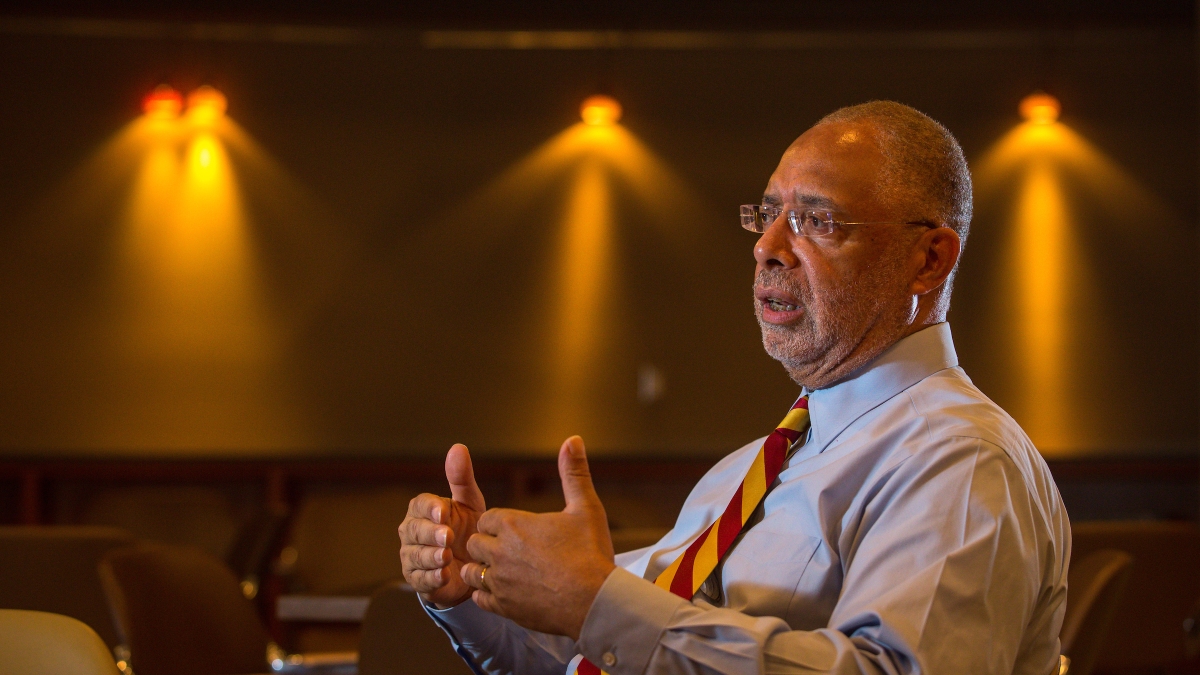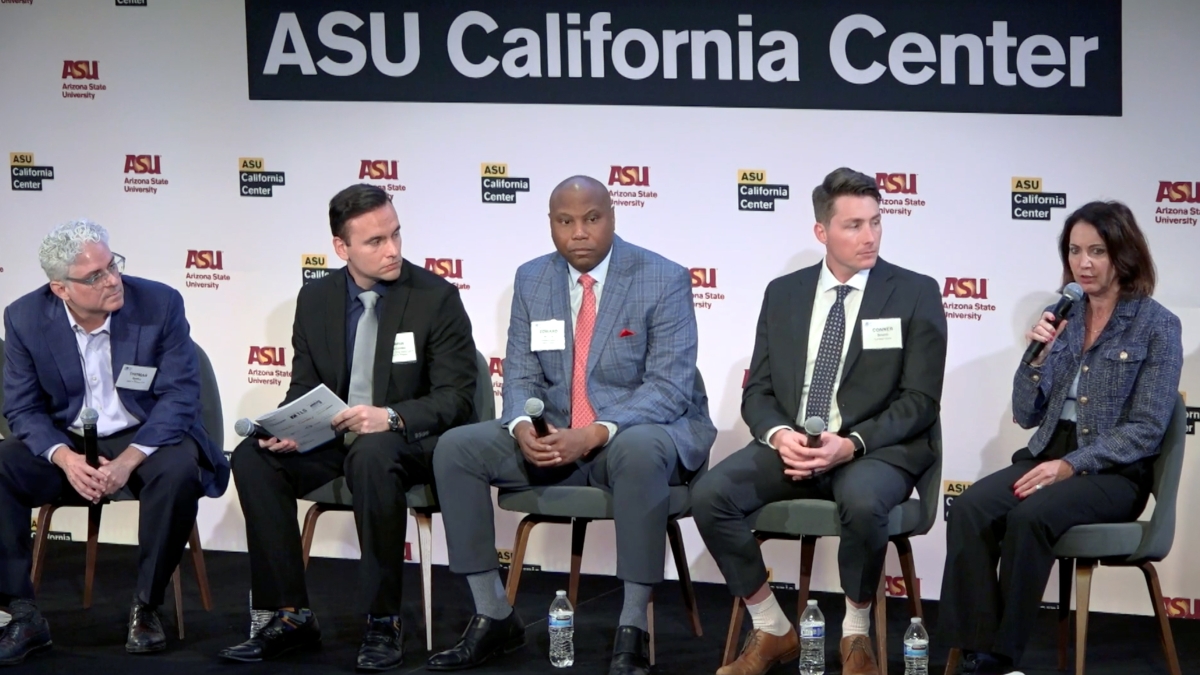American Bar Association elects ASU Law Professor Myles Lynk to Board of Governors

Arizona State University Professor Myles Lynk is one of the most respected law professors the country, and a national organization has affirmed it.
Lynk has been tapped by the likes of the White House, ASU’s president and the chief justice of the United States for his objective legal mind, as well as his sense of fairness.
More recently he was elected by the American Bar Association (ABA) to serve on its Board of Governors, which meets about four times a year and oversees the general operation of the association and develops specific plans of action.
“At its best, in America the law is an instrument that helps define and protect the rights of even the weakest among us while restraining even the most powerful from abusing the rights of others,” said Lynk, a professor in ASU’s Sandra Day O’Connor College of Law.
“Thus, I agree with the great English philosopher John Locke, who wrote, ‘Wherever law ends, tyranny begins.’”
ASU Now caught up with Lynk, who is gearing up for his three-year term with the ABA starting in August.
Question: Congratulations on your new appointment. What does this mean for ASU Law?
Answer: It is not often that a law professor is elected to the Board of Governors of the American Bar Association. I think my election will give ASU Law a greater visibility to the bar nationally, and will afford me an opportunity to showcase the excellence of ASU Law's faculty, students and resources.
Q: What function does the board perform, and how is this important to the law nationwide?
A: Founded in 1878, and with almost 400,000 members today, the ABA is one of the largest voluntary professional membership organizations in the world. The Board of Governors consists of 44 members, including the officers of the association and board members elected from geographical districts, from the sections of the association, and from different constituencies within the association such as judges and young lawyers.
I am being elected as what is known as a Goal III representative, representing the broad group of minority members of the association. The board oversees the general operation of the association, develops specific plans of action to develop and maintain the work of the association and has the authority to speak and act for the ABA.
The ABA is important to the development of uniform principles in the law, in the promotion of ethical standards for the profession, and for the protection of the public, nationwide.
Q: How does our nation’s law system compare with other countries around the world?
A: “Equal justice under law” are the words that are carved into the Supreme Court building in Washington, D.C. This is what we strive for and, I believe, achieve to a greater degree than most other countries around the world. Though it is complex, the legal system in the United States is more transparent than in many other countries.
While access to justice and the availability of legal representation for all remain serious issues that our nation must confront, our courts and justice system are administered with integrity and competence. In fact, one of the reasons that non-U.S. citizens are so willing to invest their funds in the U.S. and immigrate to the U.S. is because of their confidence in our legal system. No legal system can be perfect, but for a heterogeneous society such as ours is, the American legal system is one of the ways we define our sense of community as a people, “under law.”
Q: What is your personal philosophy of the law?
A: I see the law as an instrument, as the means by which societies order their priorities of social organization and provide a socially acceptable way to punish wrongdoers and resolve civil disputes that arise within the society. I definitely view the law as a vehicle that can promote equal justice and social order, but I recognize that it can also be used to protect the status quo.
Today, our civil society is challenged to find in the law ways to address the tensions that exist between our constitutionally guaranteed rights of free speech and free association, and the equally important rights of all Americans to be fully integrated into a society that protects them from discrimination, hate crimes and harassment. We are also challenged to enact and enforce laws that deal responsibly with the complexities of immigration into our country. At its best, in America the law is an instrument that helps define and protect the rights of even the weakest among us while restraining even the most powerful from abusing the rights of others. Thus, I agree with the great English philosopher John Locke, who wrote, "Wherever law ends, tyranny begins."
Q: What is so intriguing about the law that keeps you interested in the field?
A: After all these years, the rule of law and the role of lawyers in society continue to fascinate me. As chair for the past three years of the ABA's Standing Committee on Ethics and Professional Responsibility, I have been able to help interpret and develop the very rules that guide the conduct of lawyers in their professional lives, and as a professor of law here at ASU, I have been fortunate to be able to study the law, and to teach the law to the next generations of lawyers. The hopeful enthusiasm of my students enriches me and encourages me. They may not keep me young in fact, but they have kept me young in spirit and in my own enthusiasm for the rule of law in America.
Top photo: Sandra Day O'Connor College of Law Professor Myles Lynk was recently elected to the American Bar Association's Board of Governors, which oversees the general operation of the association and develops specific plans of action. Photo by Charlie Leight/ASU Now
More Law, journalism and politics

TechTainment conference explores the crossroads of law, technology, entertainment
What protections do writers, actors, producers and others have from AI? Will changing laws around name, image and likeness (NIL) eliminate less lucrative college sports?And what does the No…

How to watch an election
Every election night, adrenaline pumps through newsrooms across the country as journalists take the pulse of democracy. We gathered three veteran reporters — each of them faculty at the Walter…
Law experts, students gather to celebrate ASU Indian Legal Program
Although she's achieved much in Washington, D.C., Mikaela Bledsoe Downes’ education is bringing her closer to her intended destination — returning home to the Winnebago tribe in Nebraska with her…